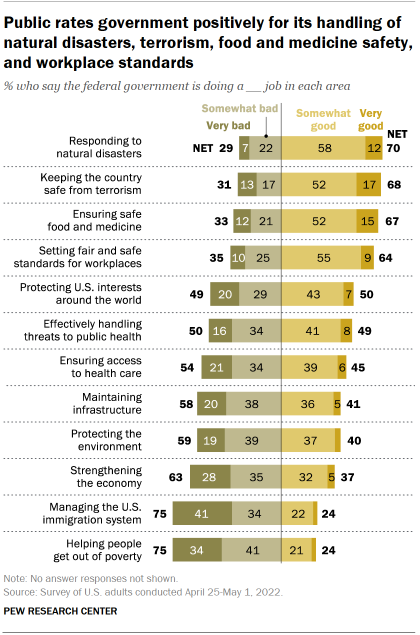
Americans’ evaluations of the federal government’s performance in specific realms have shifted somewhat since 2020. For the most part, these shifts reflect changes in the political landscape: Democrats tend to rate the government’s performance more positively now than when Donald Trump was president, while Republicans have adopted more negative views – a similar, inverse shift in evaluations was seen between 2015 (during Barack Obama’s presidency) and the fall of 2017 (several months into Trump’s term). Still, as in the past, the public makes distinctions in its evaluations of the federal government’s performance in different realms – giving high marks in some areas and very low marks in others.
The public’s views of the appropriate role for government have, for the most part, changed only modestly over time. While most Americans say the government should have a major role on such issues as terrorism and immigration, there is less agreement about other areas – notably, in alleviating poverty.
High marks for government’s handling of disasters, terrorism, safety of food and medicine
Seven-in-ten Americans say that the federal government is doing a very or somewhat good job in responding to natural disasters. Similar shares say that the government is doing a good job at keeping the country safe from terrorism (68%), ensuring that food and medicine are safe (67%) and setting fair standards for workplaces (64%).
About half of Americans give positive assessments of the government’s performance protecting U.S. interests around the world and effectively handling threats to public health.
The public is more critical of the government’s performance in other areas: Just 37% say it is doing at least a somewhat good job of strengthening the economy and only about a quarter give the government positive ratings for managing immigration and helping people get out of poverty (24% each).
As in the past, there are sizable partisan differences in views of government performance. Democrats and Democratic-leaning independents are more likely than Republicans and GOP leaners to give positive assessments on all but two items in the survey – ensuring access to health care and protecting the environment.
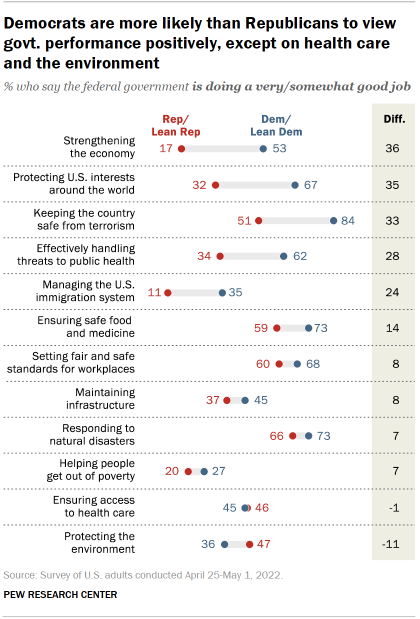
One of the widest partisan divides in views of government performance – of 12 items included in the survey – is on strengthening the economy. About half of Democrats (53%) say the federal government is doing a very or somewhat good job strengthening the economy. Only 17% of Republicans say the same.
There are similar gaps between partisans in assessments of protecting U.S. interests around the world, keeping the country safe from terrorism and effectively handling threats to public health.
Democrats are most positive in their assessments of the federal government’s performance keeping the country safe from terrorism: An overwhelming 84% majority say the government is doing a good job at this.
About three-quarters of Democrats also say the government is doing a very or somewhat good job of ensuring that food and medicine are safe and responding to natural disasters (73% each).
While Republicans are more negative in their assessments of government performance than they were in 2020, there are some areas where Republicans say the government is doing a good job. For instance, about two-thirds of Republicans (66%) say the government is doing a good job responding to natural disasters.
Six-in-ten Republicans also offer positive views of government performance on setting fair and safe standards for workplaces and a similar majority (59%) say the same about ensuring that food and medicine are safe.
The only area in which a significantly larger share of Republicans rate the job the federal government is doing more positively than Democrats is on protecting the environment. About half of Republicans (47%) say this, compared with 36% of Democrats. Nearly equal shares in both parties say the government does a good job of ensuring access to health care (46% of Republicans, 45% of Democrats).
Large partisan shifts in views of government performance since 2020
On many issues, Democrats now offer more positive assessments and Republicans offer more negative assessments than in 2020 during the Trump administration. This is a continuation of a pattern in which partisans tend to have more positive views of government when the presidency is held by a member of their party. GOP assessments of government were higher, and Democratic assessments lower, in 2017 and 2020 than both today and in 2015 (during the Obama administration).
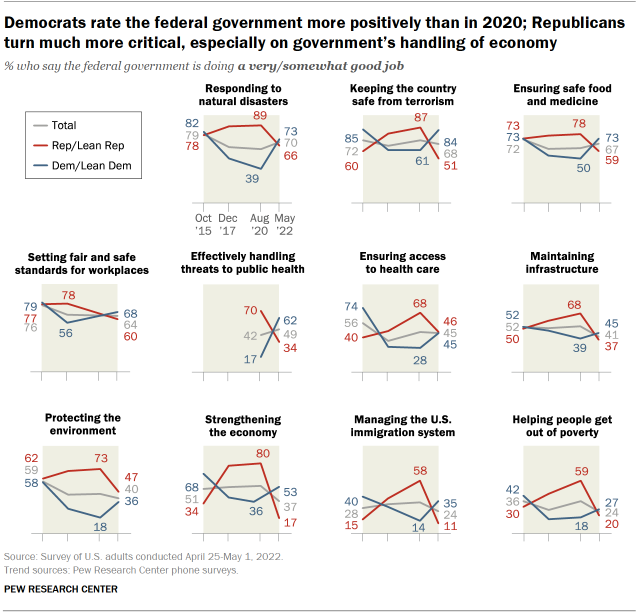
In 2020, 70% of Republicans said the government was doing a good job handling threats to public health, while just 17% of Democrats said the same. Today, 62% of Democrats approve of the job the government is doing handling threats to public health, while only about a third of Republicans (34%) say this.
Republicans have become much more critical of the government’s handling of the economy than they were two years ago: In 2020, 80% had positive assessments of the job the government was doing to strengthen the economy, but today, just 17% say the same. Among Democrats, there has been a more modest increase in positive views: Two years ago, 36% said the government was doing a good job strengthening the economy, today about half of Democrats (53%) say this.
In 2020, 87% of Republicans gave the government positive ratings for keeping the country safe from terrorism. Today, about half (51%) say the same. Among Democrats, 84% give the government positive ratings on this issue today, similar to Republicans two years ago.
When it comes to managing the immigration system, a 58% majority of Republicans gave positive assessments of the government’s performance in 2020. Today, just 11% say this, a 47 percentage point drop. Democrats are 21 points more positive on this issue than they were in 2020 (35% now, 14% then).
Both parties give the government low ratings for helping people get out of poverty. For Republicans, this is a change from 2020; today, just 20% say the government is doing well in alleviating poverty, down from 59% two years ago. Democrats also give the government low ratings for lifting people out of poverty (27% very/somewhat good today, 18% in 2020).
Large majorities say the government should play a major role in many areas
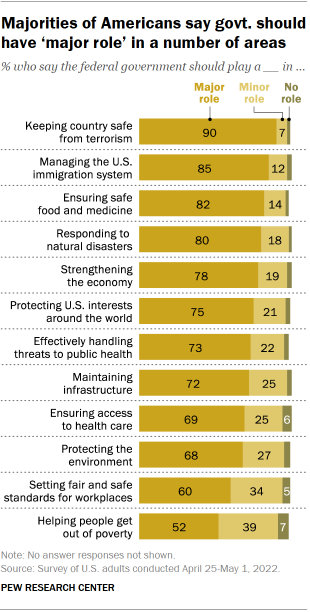
Majorities of adults say that the federal government should play a major role in all but one of the 12 areas asked about in the survey. Nine-in-ten say the government should play a major role in keeping the country safe from terrorism and more than eight-in-ten say the same about managing immigration (85%), ensuring that food and medicine are safe (82%) and responding to natural disasters (80%).
More than three-quarters of Americans (78%) say that the federal government should play a major role in strengthening the economy. Nearly as many (73%) say the same about the role of the federal government in effectively handling threats to public health.
A somewhat smaller majority (60%) say that the government should play a major role in setting fair and safe standards for workplaces. And about half of adults (52%) say that the federal government should play a major role in helping people get out of poverty, ranking lowest of 12 items in the survey; 39% say it should play a minor role and just 7% say it should not play a role.
While large majorities of the public say that the federal government should play a major role in nearly all of the issue areas included on the survey, as in the past, the shares who say the federal government is doing a good job on those same areas is consistently lower.
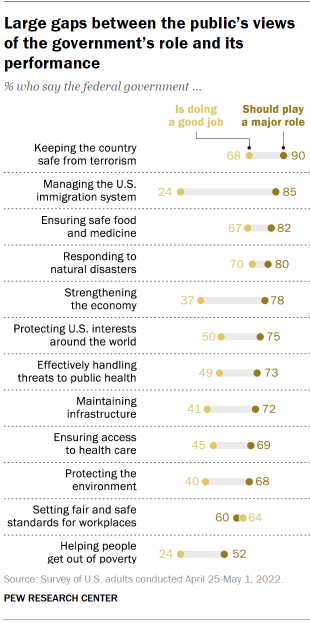
The largest gap is on managing the U.S. immigration system. An overwhelming 85% majority of adults say that the federal government should play a major role in managing the U.S. immigration system. However, just 24% say the government is doing a very or somewhat good job in this area.
Similarly, more than three-quarters of Americans say that the federal government should play a major role in strengthening the economy, while 37% say that it is doing a good job.
On most other issues included in the survey, there is a sizable gap between views of the role of the government and the job the federal government is doing.
The only issue where the share of the public saying the government should play a major role is not higher than its assessment of the government’s performance is setting fair and safe standards for workplaces.
Six-in-ten Americans say the government should play a major role in setting fair and safe standards for workplaces, while a roughly similar share (64%) say it is doing a good job on this.
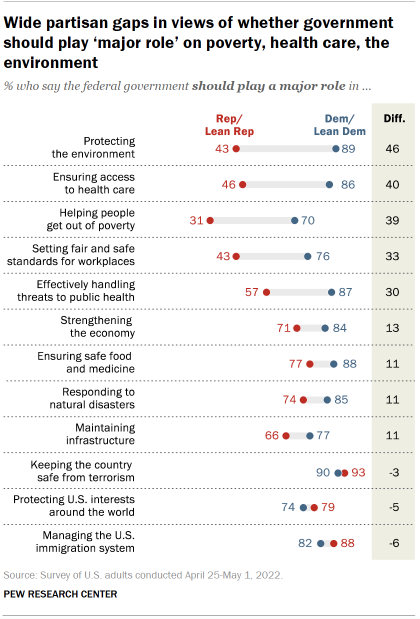
There are deep divides between Democrats and Republicans on the role of the federal government across many of the 12 issues included in the survey. The largest gap is on protecting the environment. Nearly nine-in-ten Democrats (89%) say the federal government should play a major role in protecting the environment; fewer than half of Republicans (43%) say the same. Half of Republicans say the government should have a minor role in protecting the environment; just 7% say it should have “no role at all.”
There are similarly large gaps over the extent to which the government should play a role in ensuring access to health care (86% of Democrats and 46% of Republicans say it should play a major role) and helping people get out of poverty (70% of Democrats, 31% of Republicans).
Large shares of both Republicans and Democrats say that the government should play a major role in strengthening the economy, although Democrats are somewhat more likely to say this.
Similar shares of partisans say that the government should play a major role in keeping the country safe from terrorism and protecting U.S. interests around the world.
Managing the U.S. immigration system is the only issue in the survey where Republicans are more likely than Democrats to say the government should play a major role, although at least eight-in-ten in each party say this (88% of Republicans, 82% of Democrats).
While views of the role of government have remained largely consistent, the shares of the public saying the federal government should play a major role in helping people get out of poverty and effectively handling threats to public health have declined since 2020.
In 2020, a 62% majority said the government should play a major role in helping people get out of poverty; today, about half of Americans (52%) say this. On handling public health threats, a somewhat smaller share of adults today (73%) say that the government should play a major role in effectively handling threats to public health than said this two years ago (78%).
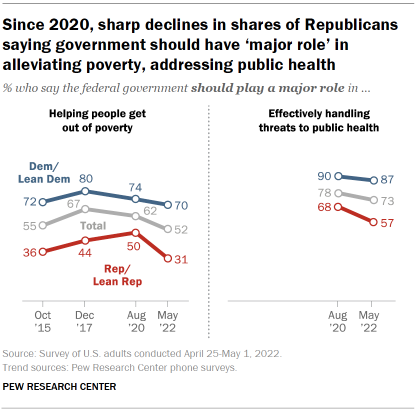
For both of these issue areas, these declines are particularly pronounced among Republicans.
In 2020, half of Republicans said the government should play a major role in helping people get out of poverty. Today, only 31% say this.
Two years ago, about two-thirds of Republicans (68%) said the government should play a major role in handling threats to public health; a smaller majority (57%) say this today.
There were no substantive declines among Democrats on the role of government for these two issue areas.
In their own words: What Americans think of federal and state government performance
When asked to name some areas where the federal government is doing a good job, roughly four-in-ten Americans (41%) offer an answer.
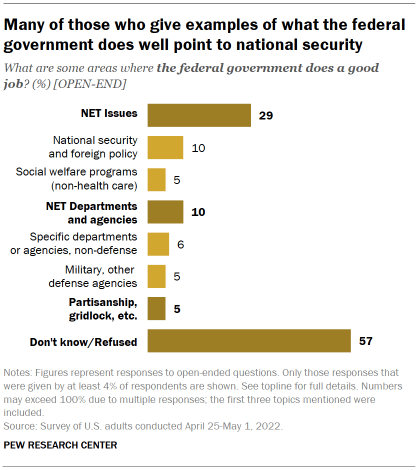
About three-in-ten (29%) name a specific issue or issue areas where the government is doing a good job, covering a wide range of government policies and programs.
One-in-ten specifically cite national security or foreign policy, with topics ranging from defending the country from terrorism, to international trade, to the response to Russia’s invasion of Ukraine. One man in his 20s says the government does a good job “working together when a major emergency occurs, such as sending aid to Ukraine.”
A smaller share (5%) refers to a variety of social welfare programs, including Social Security and the stimulus checks many Americans received in response to the coronavirus pandemic. An additional 3% of adults discuss the federal government’s performance on issues related to health care or its administration of programs such as Medicare and Medicaid.
One-in-ten adults discuss specific branches, departments or agencies within the government that they say are performing well. This includes 5% who point to the military and agencies tasked with national security, and a similar share who name other specific departments and agencies, ranging from the Centers for Disease Control and Prevention (CDC) to the National Parks Service to the U.S. Census Bureau.
A small but notable share of adults (5%) answer this question by saying that the government does a “good” job at failing to serve the people. For example, a woman in her 40s says that she “can’t think of anything they are good at, besides wasting taxpayers’ money and time.”
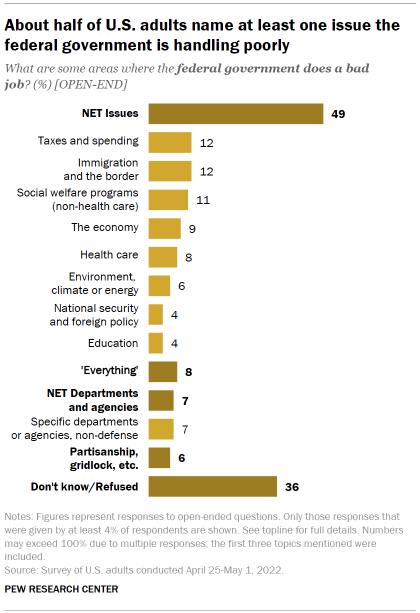
About six-in-ten adults (63%) provide an answer when asked to name some areas where the federal government is doing a bad job, including 49% who name a specific issue or issue area.
About one-in-ten each cite taxes and spending (12%), immigration and the border (12%), social welfare programs (11%), the economy (9%) or health care (8%). In contrast to those who name social welfare programs as a positive area of government performance, one woman in her 60s who views the federal government’s performance in this area negatively says it fails in “not making sure the people that need help are getting it. Too many people that are able to work are receiving money and help they don’t need.”
A small share of Americans (7%) point to specific agencies and departments. However, in sharp contrast to comments about what the federal government is doing well, hardly any Americans (1%) name the military or national security agencies as parts of the government that are doing a bad job. And 8% offer that the entire federal government is performing poorly.
Another 6% of adults express complaints about politicians or the political process as areas where the government is doing a poor job. As a woman in her 50s says, “They are completely partisan, and many good ideas or bills get tossed because both sides can’t compromise to come up with legislation that would be helpful to the American people. They spend more time stopping legislation than they do passing anything.”
Views of state government performance
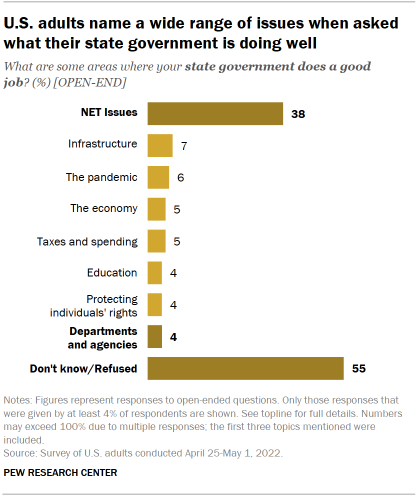
When asked to name some areas where their state government is doing a good job, 38% of Americans name specific issue areas, while 4% name components of the state government such as specific departments or elected officials. Just over half of respondents (55%) do not offer a response. Asked what their state government does poorly, 49% name specific issue areas, 3% cite components of the state government, and about four-in-ten (39%) do not offer a response.
Infrastructure is among the most commonly cited issues among those discussing both positive and negative aspects of their state government’s performance, though those discussing areas where their state government is doing a bad job are somewhat more likely to name this than those discussing areas where their state government is doing a good job (12% vs. 7%). The condition of roads within the state is an important topic for many, though some are also concerned with the high cost of utilities or with internet access in certain areas of their state.
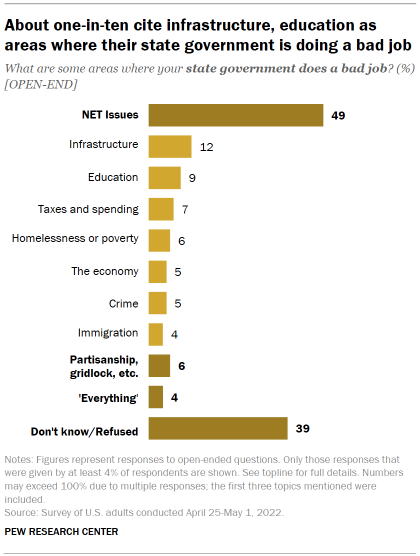
Nearly one-in-ten (9%) name education as an area where their state is doing a bad job, roughly twice as many as the share who say it is an area where their state is doing a good job (4%). One woman in her 70s notes the good intentions of many officials, saying, “Some in state government do care about citizens and do their best to benefit us, such as education, health care, etc.” By contrast, a man in his 40s asserts, “We need more funding for K12 education” in his state.
As with federal government performance, Americans name a wide variety of policy areas where their state governments are performing well or where they could perform better. Beyond infrastructure and education, state governments’ handling of taxes and spending, homelessness and poverty, the economy, crime and the COVID-19 pandemic are among the most commonly cited issues – both good and bad.
Additionally, 6% of adults express concerns about the motives of politicians and gridlock in the political process when it comes to their state government’s performance. This is identical to the share of adults who offer up that the federal government’s performance is hampered by these types of problems. And as with the federal government, a small but sizable share says that every or just about every part of their state government is doing a bad job, with 4% saying this.




